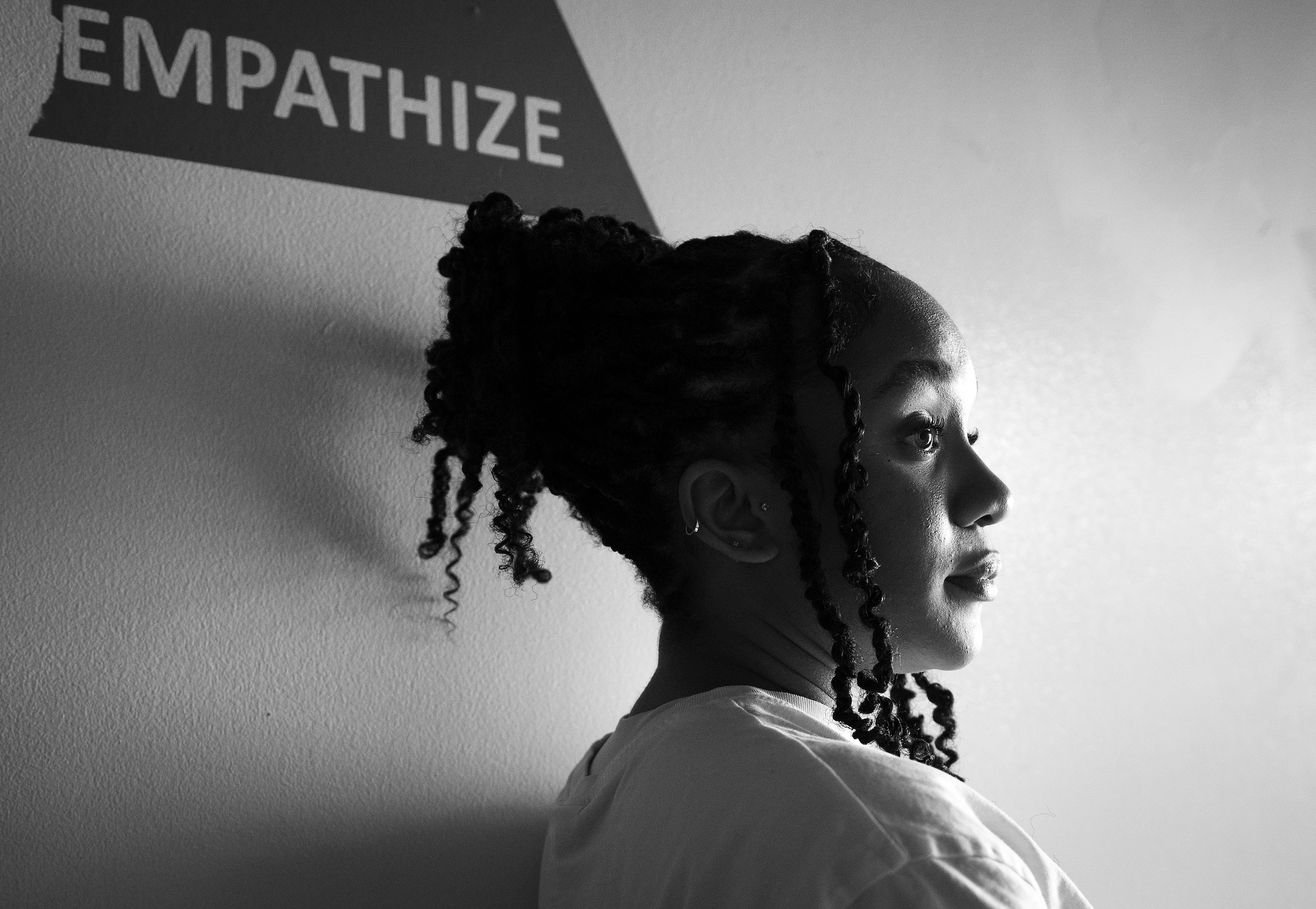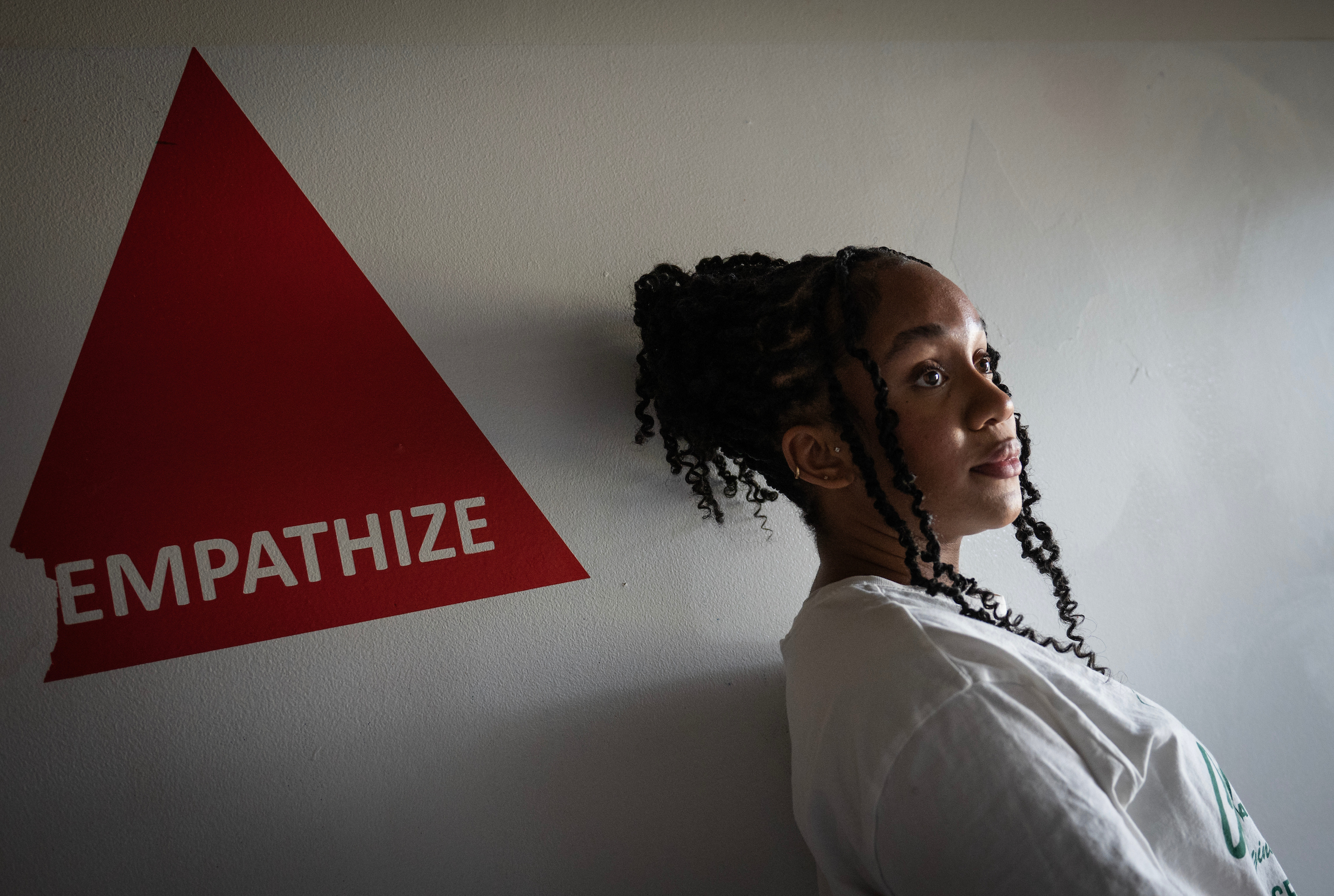Hunter is one of the members of the graduating class to be featured on Today at Elon as a "profile of resilience" for her ability to adapt and succeed in the face of the global COVID-19 pandemic.
Caring is what defines Kiara Hunter ’23. Before deciding that Elon would be her home for the next four years, she was unsure of what career path she wanted to take. But her concern for certain matters was unwavering.
Issues of criminal justice, voting rights, maternal and child wellness, the physical structures of neighborhoods and the impact they have on opportunities later in life were of interest to Hunter even before she arrived at Elon nearly four years ago. Some hit close to home. But it wasn’t until she discovered the interdisciplinary field of public health that she saw a path for her to address those many topics that inspired her.
“Public health allowed me to see the whole picture,” Hunter said. “Often, we tie things back to health outcomes, but health is more than physical.”
Hunter is a member of the Class of 2023, which arrived on campus in August 2019 preparing to have a “normal” first year of college, only to have the pandemic cause an early departure from campus and a college experience that was disrupted by health and safety protocols, travel restrictions, anxiety about the future, an evolution of the learning environment and constantly changing plans. She is among this year’s graduating seniors to be featured on Today at Elon as “profiles of resilience” for the way they faced the challenges posed by the COVID-19 pandemic and adapted to find meaning and success during an uncertain time.
Arriving at Elon
An Odyssey Scholar, Hunter integrated herself into campus life without a hitch — until the spring semester when the COVID-19 pandemic forced students to return home early and complete the semester from afar. What many students thought would be an extended spring break became a years-long and still active process of trying to navigate the COVID-19 pandemic.
At first, the shutdown allowed Hunter to get some well-needed rest and provided a forced pause that allowed her to frame what she wanted to gain from her Elon experience.
And although she was a reasonably active first-year student, the pandemic made her take a greater appreciation of all the opportunities available to her. And more than just appreciating them, Hunter dove headfirst into as much as she could. “I think part of the resilience that I was able to exemplify was also fostered by the fact that I could come back and pick back up,” Hunter said.
And pick back up she did. In just four short years, while adjusting to and avoiding the many obstacles deriving from COVID, Hunter has completed all five of the Elon Experiences. Spending a semester abroad in Cape Town, South Africa; a service trip to Puerto Rico for hurricane relief; serving as treasurer of Elon’s Student Government Association, interning with the Helping Each Adolescent Reach Their Spark (H.E.A.R.T.S.) initiative; and receiving the institution’s highest undergraduate research award, the Lumen Prize, for her research on Black adolescent and young adult fatherhood have enriched her undergraduate experience.
Everything that I’m involved with, in some way, goes back to my passions, which are racial health equity and building community involvement.
Completing the full range of Elon Experiences wasn’t something Hunter planned when she was starting out during her first year. With the pandemic closing a path to connections she’d developed after her first semester, she realized just how important a sense of community was for her. Hunter’s time at Elon is the epitome of unifying personal passions with the opportunities available to all Elon students.
“Everything that I’m involved with, in some way, goes back to my passions, which are racial health equity and building community involvement,” she said. “And at Elon, all you have to do is go on Phoenix Connect and find something that aligns with you.”
H.E.R. Lab and the Lumen Prize
One involvement that is of particular significance to Hunter is her work with the Health, Equity and Racism (H.E.R.) Lab. The H.E.R. Lab strives to advance the body of knowledge that illustrates racism as one of the root causes of health inequities and cultivate the action taken toward undoing racism and improving population health through three focal areas: research, capacity building and advocacy/action. Stephanie Baker, associate professor of public health studies, and Yanica Faustin, assistant professor of public health studies, co-founded the H.E.R. Lab and offered a pilot of the program to their respective research mentees.
Baker, who is also the chair of the Department of Public Health Studies, mentored Hunter for her Lumen Prize research. When the H.E.R. Lab began in April 2021, Baker offered Hunter the chance to participate and she didn’t think twice about the opportunity. Baker first met Hunter as a first-year student during an Odyssey Scholar meet-and-greet after she displayed an interest in public health.

Hunter soon took Baker’s Introduction to Public Health Studies course and exhibited a deeper interest in the topics covered than most students, Baker said. “To me, that was an indication that she might have an interest in participating in research.”
Baker broached the idea of applying for the Lumen Prize, and she and Hunter have been working together ever since. In the last four years, Baker said not only has their bond deepened beyond one of mentor-mentee but one of mutual growth and self-actualization.
“Mentoring is not just about how to do research. It’s also about becoming your full self and having space to become your full self, and I think I’m on that journey as well,” Baker said.
“I do mostly community-based participatory research and Kiara is using elements of that in her research. That approach requires you to humble yourself to get to know who you are and how you’re showing up with your community partners. It requires you to bring your full self into the research and not hide behind titles and labels,” she added.
Mentoring is not just about how to do research. It’s also about becoming your full self and having space to become your full self, and I think I’m on that journey as well.
Hunter said Baker’s guidance has been invaluable. “She’s kind of been my inspiration when it comes to health equity and community-based research. Because she’s not afraid to challenge her own, or others, thinking. So, she’s a reminder for me that no matter how far you get into this work, there’s always something you can learn. There are always biases that you need to check within yourself.
“Similarly, I will say that Dr. Faustin … empowers me to take ownership of learning and infuse that with real-world situations.” Another mentor Hunter mentions having greatly improved her time at Elon is the Inaugural Chair of the Department of Nursing Tiffany Morris, who also happens to be her godmother. “She has academically, spiritually, socially and mentality been a sounding board for me.”
Meaningful Mentors
It’s these mentors who have made what could’ve otherwise been a tumultuous experience for Hunter into one of purpose and fulfillment. With all that she’s accomplished, Hunter says her most recent example of being resilient has been in the process of applying for fellowships. In the last two years, Hunter applied for scholarship after scholarship, only to be denied at each turn.
She didn’t see those roadblocks as failures but as steps to eventually realizing that goal as she was selected for the Rotary Global Grant Scholarship for graduate study abroad. “I’ve built up the stamina that I see as resilience, and I finally got the scholarship,” Hunter said.
Baker could sense Hunter’s disappointment as each previous fellowship opportunity fell through. When giving up would have been the easier and most common route for some students, Baker was impressed with Hunter’s unwavering determination as she continuously went back to the drawing board, refusing to be denied.
“That is telling about her growth because it’s not just about the outcome, it’s about the process. She has talked about how the process of writing each application required her to reflect on her development, her growth and what she’s learned in her time here at Elon, and that was really beautiful,” Baker said.
Hunter will arrive at University College London in the fall with her same spirited attitude and care for issues of public health as she pursues her master’s degree in population health working toward her long-term goal of becoming a public health analyst. “I’ll be in London for a year, learning and figuring out about Kiara,” she said, “but also more about public health, integrating research and implementation … of culturally appropriate and community-based programs.”
Baker knew early on that Hunter was a special student. In the last four years, she’s witnessed Hunter’s growth both academically and personally and she can’t say that Hunter’s development has been much of a surprise.
“What makes her a superstar is not just academic brilliance. It’s humility, it’s kindness, it’s thoughtfulness,” Baker said.



